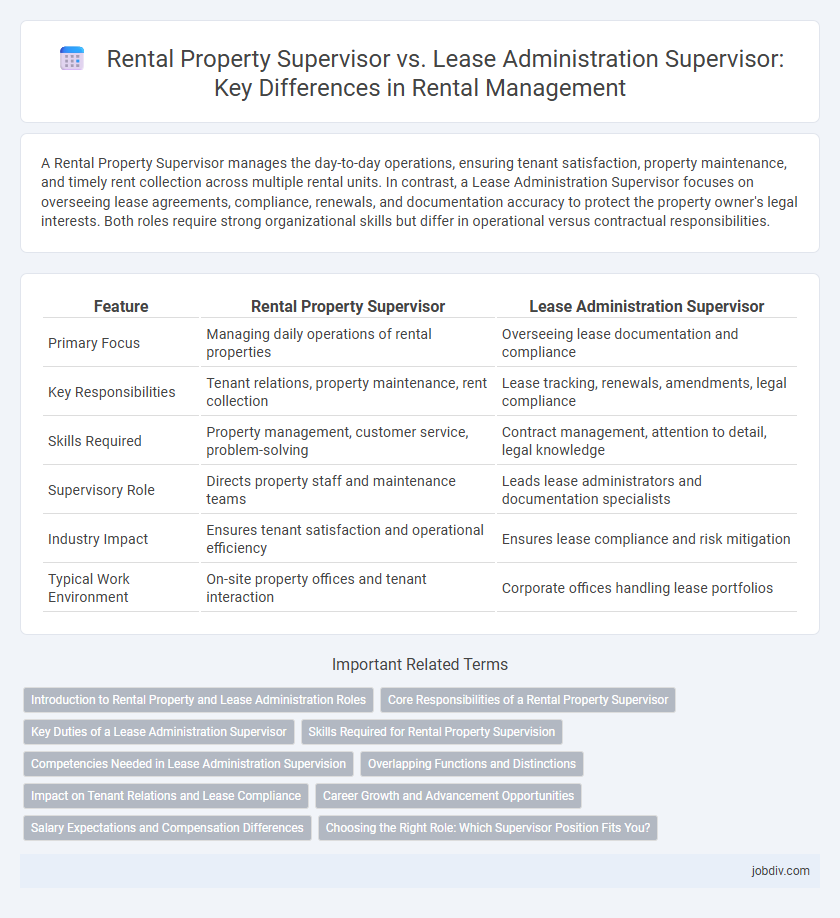A Rental Property Supervisor manages the day-to-day operations, ensuring tenant satisfaction, property maintenance, and timely rent collection across multiple rental units. In contrast, a Lease Administration Supervisor focuses on overseeing lease agreements, compliance, renewals, and documentation accuracy to protect the property owner's legal interests. Both roles require strong organizational skills but differ in operational versus contractual responsibilities.
Table of Comparison
| Feature | Rental Property Supervisor | Lease Administration Supervisor |
|---|---|---|
| Primary Focus | Managing daily operations of rental properties | Overseeing lease documentation and compliance |
| Key Responsibilities | Tenant relations, property maintenance, rent collection | Lease tracking, renewals, amendments, legal compliance |
| Skills Required | Property management, customer service, problem-solving | Contract management, attention to detail, legal knowledge |
| Supervisory Role | Directs property staff and maintenance teams | Leads lease administrators and documentation specialists |
| Industry Impact | Ensures tenant satisfaction and operational efficiency | Ensures lease compliance and risk mitigation |
| Typical Work Environment | On-site property offices and tenant interaction | Corporate offices handling lease portfolios |
Introduction to Rental Property and Lease Administration Roles
A Rental Property Supervisor manages daily operations of residential or commercial rental properties, ensuring tenant satisfaction, property maintenance, and lease compliance. A Lease Administration Supervisor focuses on overseeing lease agreements, handling documentation, renewals, and ensuring legal and financial adherence across properties. Both roles are essential for effective property management and tenant relations within the rental industry.
Core Responsibilities of a Rental Property Supervisor
A Rental Property Supervisor oversees property operations, tenant relations, and maintenance coordination to ensure optimal occupancy and tenant satisfaction. Responsibilities include managing rental pricing strategies, supervising leasing agents, conducting property inspections, and resolving tenant issues promptly. This role focuses on maximizing rental income while maintaining property standards and compliance with local housing regulations.
Key Duties of a Lease Administration Supervisor
A Lease Administration Supervisor manages lease documentation, ensures compliance with lease terms, and coordinates rent payments and renewals, optimizing lease portfolios for financial performance. They oversee tenant records, handle lease negotiations, and resolve discrepancies in lease agreements to support property management objectives. Their role requires detailed knowledge of lease clauses and regulatory requirements to mitigate risks and enhance operational efficiency.
Skills Required for Rental Property Supervision
Rental Property Supervisors require strong skills in tenant relations, property maintenance coordination, and financial oversight to ensure smooth daily operations. Expertise in conflict resolution, lease compliance, and vendor management is essential for maintaining property standards and tenant satisfaction. Proficiency in property management software and understanding of local housing laws enhance efficiency and legal adherence.
Competencies Needed in Lease Administration Supervision
Lease Administration Supervisors require strong competencies in contract management, legal compliance, and negotiation skills to effectively oversee lease agreements and ensure regulatory adherence. Proficiency in financial analysis and attention to detail are critical for managing rent schedules, lease renewals, and resolving tenant disputes. Effective communication and organizational abilities enable seamless coordination between property management teams and stakeholders, optimizing lease portfolio performance.
Overlapping Functions and Distinctions
Rental Property Supervisors and Lease Administration Supervisors both manage lease agreements ensuring compliance and tenant satisfaction, but Rental Property Supervisors focus more on property maintenance and tenant relations. Lease Administration Supervisors specialize in overseeing lease documentation, rent collection processes, and legal lease enforcement. Overlapping functions include monitoring lease terms and resolving tenant issues, yet distinctions lie in the operational versus administrative emphasis of their roles.
Impact on Tenant Relations and Lease Compliance
Rental Property Supervisors oversee daily tenant interactions, ensuring prompt resolution of maintenance issues and fostering positive tenant relations, which directly enhances tenant satisfaction and retention. Lease Administration Supervisors focus on strict adherence to lease terms, managing lease documentation, renewals, and compliance to minimize legal risks and ensure accurate rent collection. Together, these roles balance tenant engagement with regulatory compliance, supporting stable occupancy and financial performance.
Career Growth and Advancement Opportunities
Rental Property Supervisors typically gain hands-on experience managing tenant relations and property operations, enabling career growth into regional property management or asset management roles. Lease Administration Supervisors specialize in contract management and compliance, opening pathways to senior lease administration or real estate portfolio management positions. Both roles offer advancement opportunities, but Lease Administration Supervisors often transition more smoothly into corporate real estate strategy and legal advisory careers.
Salary Expectations and Compensation Differences
Rental Property Supervisors typically earn an average salary ranging from $50,000 to $70,000 annually, reflecting their hands-on management of multiple rental units and tenant relations. Lease Administration Supervisors usually command higher compensation, often between $65,000 and $85,000 per year, due to their specialized focus on lease documentation, compliance, and contract negotiations. Differences in pay are influenced by factors such as geographic location, company size, and the specific scope of supervisory responsibilities within the rental property sector.
Choosing the Right Role: Which Supervisor Position Fits You?
Choosing between Rental Property Supervisor and Lease Administration Supervisor hinges on your strengths and interests; the former emphasizes hands-on property management, tenant relations, and maintenance oversight, while the latter focuses on contract compliance, lease documentation, and regulatory adherence. Rental Property Supervisors typically excel in operational leadership and customer service, managing multiple properties to ensure optimal occupancy and revenue. Lease Administration Supervisors require keen attention to legal details and financial terms, ideal for professionals skilled in contract analysis and risk management within real estate portfolios.
Rental Property Supervisor vs Lease Administration Supervisor Infographic

 jobdiv.com
jobdiv.com